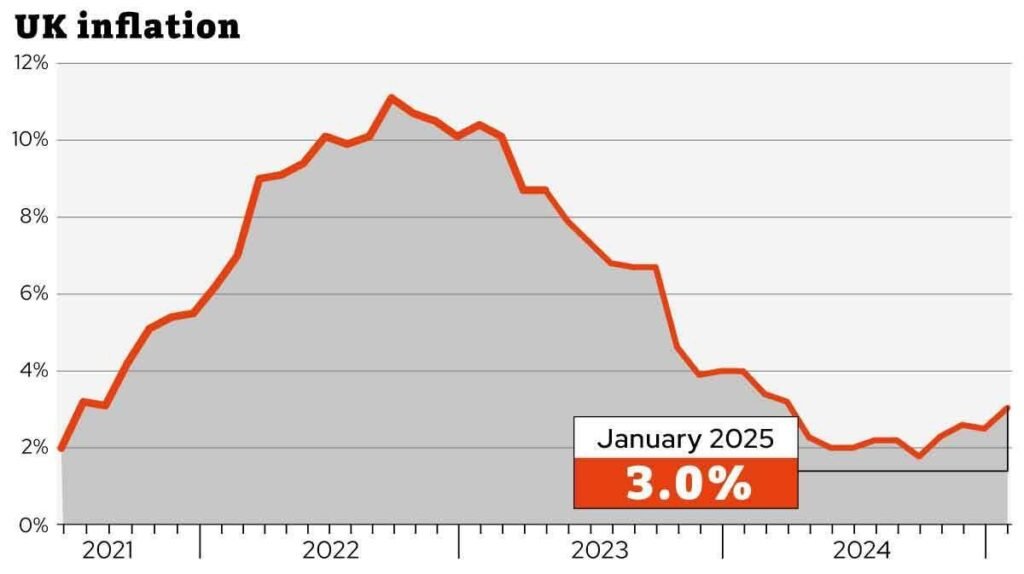Inflation has risen again after falling in last month’s reading – it is at the highest level in 10 months
Inflation rose to 3 per cent in the year to January, according to figures released by the Office for National Statistics (ONS) on Wednesday.
The Consumer Prices Index (CPI) measure of inflation is above the Bank of England’s two per cent target and marks an increase from 2.5 per cent in the year to December.
The figure is now at its highest level in 10 months with the biggest drivers of the increase coming from transport and food costs.
Core CPI, excluding energy, food, alcohol and tobacco, rose by 3.7 per cent in the 12 months to January 2025, up from 3.2 per cent in December.
Services inflation also rose to 5 per cent from 4.4 per cent.
Economists expected the figure to increase in the latest reading to around 2.8 per cent, and though inflation is higher than before, it is still much lower than the previous peak of 11.1 per cent in October 2022.
Chancellor Rachel Reeves said: “Since the election we’ve seen year on year wages after inflation growing at their fastest rate – worth an extra £1,000 a year on average – but I know that millions of families are still struggling to make ends meet.”
ONS chief economist Grant Fitzner said: “Inflation increased sharply this month to its highest annual rate since March last year.
“The rise was driven by air fares not falling as much as we usually see at this time of year, partly impacted by the timing of flights over Christmas and New Year. This was the weakest January dip since 2020.
£After falling this time last year, the cost of food and non-alcoholic drinks increased, particularly meat, bread and cereals.”
What does it mean for future inflation?
Inflation is widely expected to increase over the next year.
In October, the Office for Budget Responsibility (OBR), said that the October Budget would increase inflation, partly because some of the rise in employer national insurance contributions would be passed onto consumers in the form of higher prices.
The Bank of England is forecasting that inflation could be around 3.7 per cent by the third quarter of 2025.
Forecasts think it could go above 3 per cent before then too.
Pantheon Macroeconomics for example believes inflation will hit 3.4 per cent in April.
What does it mean for interest rates?
Higher inflation means prices are rising quicker than otherwise, and this can prompt the Bank of England to keep interest rates higher for longer.
Interest rates are currently at 4.5 per cent after being cut earlier this month.
Later this year, most forecasters expect multiple cuts to interest rates, even though inflation is going up
This is because is inflation is set to fall in the long-term and because the economy is performing poorly, with only marginal growth forecast this year. Higher rates can weigh down on the economy further.
However, as Wednesday’s reading is higher than many expected, some experts have said interest rates may fall more slowly than many predict.
Mark Eaton, chief operating officer at April Mortgages said: “A resurgence in inflation is a reminder that the Bank of England is walking a tightrope when it comes to managing interest rates.
“There has been talk of further rate cuts this year, but those predictions feel premature with prices now rising more quickly.”
What does this mean for mortgages, savings and pensions?
Mortgages
Mortgages are not directly affected by inflation, although many products are affected by the Bank of England’s base rate, which inflation influences.
Tracker products and standard variable mortgages change directly when interest rates change.
If interest rates rise as a result of increased inflation, mortgage holders on such deals will see their rates increase.
Fixed mortgages tend to work on long-term predictions for where the base rate will go. This means that a big drop in inflation can send mortgage rates down, because it can lead experts to believe the base rate will fall sooner rather than later.
Rates have been fluctuating in recent months but most experts expect them to fall over the course of the year, if interest rates go down as expected.
Wednesday’s reading could slow or reverse recent mortgage rate cuts, if it leads to traders revising their predictions for how quickly the Bank of England will reduce interest rates.
Savings
High inflation is bad news for savers as it erodes the value of money held in the bank. Therefore, the lower the rate, the better the news for savers.
The effects of inflation on the Bank of England’s interest rate also impacts savers, because of the base rate’s influence on savings rates.
Experts believe we are “past the peak” for savings, with most fixed rates now dropping below 5 per cent. This means it is worth taking advantage of the best deals now.
Currently, the best easy-access account is a cash ISA from Trading 212, paying 5.03 per cent.
Pensions
Recent drops in inflation will have been welcomed by pensioners who have been struggling with the cost of living crisis over the past two years, especially those for whom the state pension makes up a large portion of their income.
Higher inflation can eat into pensioners’ savings.
Another factor to be aware of is the impact of inflation on annuity rates.
Annuities offer a guaranteed annual income in retirement. They offer an alternative to drawing down money from a pension pot, which could eventually run out, particularly if a retiree lives longer than expected.
While they have been unpopular in recent years, rising interest rates have improved the annual incomes someone can buy.
But for retirees opting for one, time may be of the essence. With the Bank having cut interest rates, rates may start to fall.

